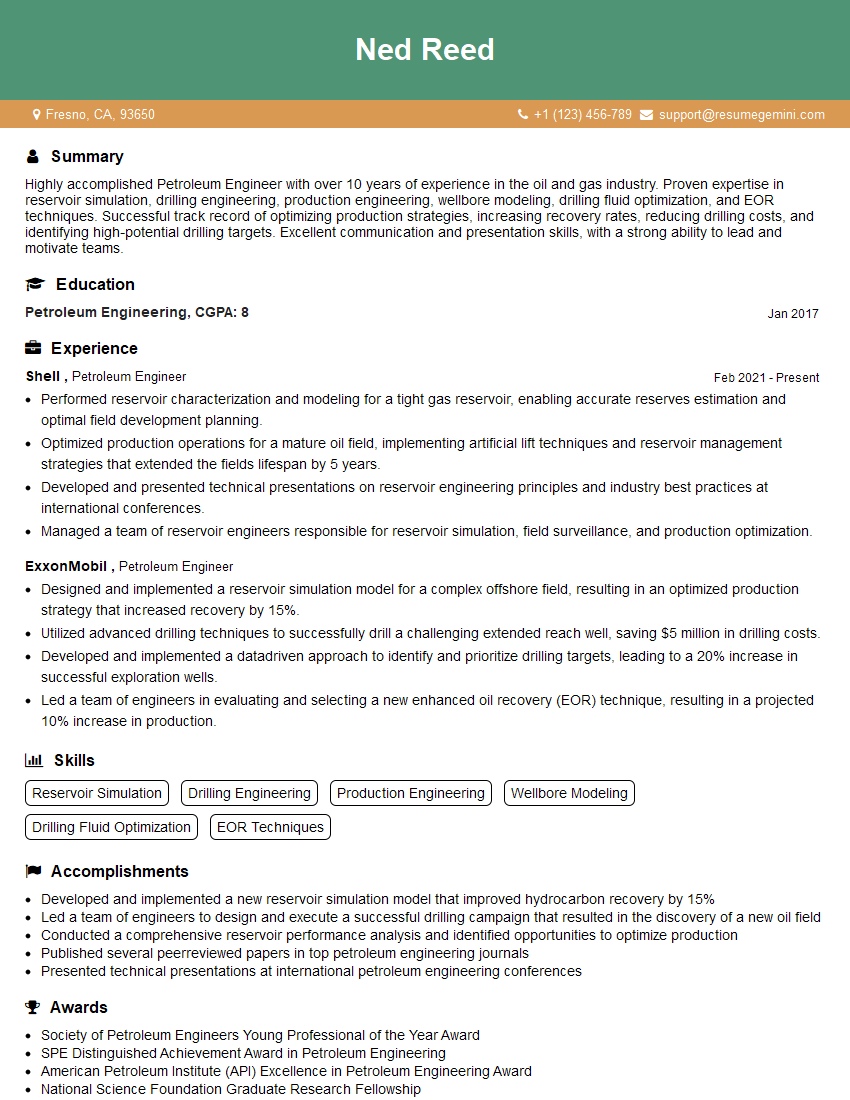Are you a seasoned Petroleum Engineer seeking a new career path? Discover our professionally built Petroleum Engineer Resume Template. This time-saving tool provides a solid foundation for your job search. Simply click “Edit Resume” to customize it with your unique experiences and achievements. Customize fonts and colors to match your personal style and increase your chances of landing your dream job. Explore more Resume Templates for additional options.

Ned Reed
Petroleum Engineer
Summary
Highly accomplished Petroleum Engineer with over 10 years of experience in the oil and gas industry. Proven expertise in reservoir simulation, drilling engineering, production engineering, wellbore modeling, drilling fluid optimization, and EOR techniques. Successful track record of optimizing production strategies, increasing recovery rates, reducing drilling costs, and identifying high-potential drilling targets. Excellent communication and presentation skills, with a strong ability to lead and motivate teams.
Education
Petroleum Engineering
January 2017
Skills
- Reservoir Simulation
- Drilling Engineering
- Production Engineering
- Wellbore Modeling
- Drilling Fluid Optimization
- EOR Techniques
Work Experience
Petroleum Engineer
- Performed reservoir characterization and modeling for a tight gas reservoir, enabling accurate reserves estimation and optimal field development planning.
- Optimized production operations for a mature oil field, implementing artificial lift techniques and reservoir management strategies that extended the fields lifespan by 5 years.
- Developed and presented technical presentations on reservoir engineering principles and industry best practices at international conferences.
- Managed a team of reservoir engineers responsible for reservoir simulation, field surveillance, and production optimization.
Petroleum Engineer
- Designed and implemented a reservoir simulation model for a complex offshore field, resulting in an optimized production strategy that increased recovery by 15%.
- Utilized advanced drilling techniques to successfully drill a challenging extended reach well, saving $5 million in drilling costs.
- Developed and implemented a datadriven approach to identify and prioritize drilling targets, leading to a 20% increase in successful exploration wells.
- Led a team of engineers in evaluating and selecting a new enhanced oil recovery (EOR) technique, resulting in a projected 10% increase in production.
Accomplishments
- Developed and implemented a new reservoir simulation model that improved hydrocarbon recovery by 15%
- Led a team of engineers to design and execute a successful drilling campaign that resulted in the discovery of a new oil field
- Conducted a comprehensive reservoir performance analysis and identified opportunities to optimize production
- Published several peerreviewed papers in top petroleum engineering journals
- Presented technical presentations at international petroleum engineering conferences
Awards
- Society of Petroleum Engineers Young Professional of the Year Award
- SPE Distinguished Achievement Award in Petroleum Engineering
- American Petroleum Institute (API) Excellence in Petroleum Engineering Award
- National Science Foundation Graduate Research Fellowship
Certificates
- SPE Certified Petroleum Engineer (SPE-PE)
- API Certified Drilling Engineer (ACDE)
- Drilling Engineering Certification (IADC)
- NACE International Cathodic Protection Technician (CP-1)
Career Expert Tips:
- Select the ideal resume template to showcase your professional experience effectively.
- Master the art of resume writing to highlight your unique qualifications and achievements.
- Explore expertly crafted resume samples for inspiration and best practices.
- Build your best resume for free this new year with ResumeGemini. Enjoy exclusive discounts on ATS optimized resume templates.
How To Write Resume For Petroleum Engineer
Quantify your accomplishments:
Use specific metrics to demonstrate the impact of your work, such as increased recovery rates, reduced costs, or improved well performance.Highlight your technical skills:
Showcase your expertise in reservoir simulation, drilling engineering, and other relevant areas.Emphasize your leadership experience:
If you have led teams or projects, be sure to highlight your ability to motivate and manage others.Tailor your resume to the job description:
Carefully review the job description and tailor your resume to match the specific requirements and keywords.
Essential Experience Highlights for a Strong Petroleum Engineer Resume
- Developed and implemented reservoir simulation models to optimize production strategies for complex oil and gas fields.
- Utilized advanced drilling techniques to successfully drill challenging wells, resulting in significant cost savings.
- Led teams of engineers in evaluating and selecting EOR techniques to enhance oil recovery.
- Performed reservoir characterization and modeling for various types of reservoirs, including tight gas reservoirs.
- Managed a team of reservoir engineers responsible for reservoir simulation, field surveillance, and production optimization.
Frequently Asked Questions (FAQ’s) For Petroleum Engineer
What are the primary responsibilities of a Petroleum Engineer?
Petroleum Engineers are responsible for designing and implementing strategies to extract oil and gas from underground reservoirs. This includes tasks such as reservoir simulation, drilling engineering, production engineering, and wellbore modeling.
What are the educational requirements to become a Petroleum Engineer?
Most Petroleum Engineers hold a bachelor’s degree in Petroleum Engineering or a related field, such as Chemical Engineering or Mechanical Engineering.
What are the job prospects for Petroleum Engineers?
The job outlook for Petroleum Engineers is expected to be good in the coming years, as the demand for oil and gas continues to grow.
What are the key skills that Petroleum Engineers need?
Petroleum Engineers need to have a strong understanding of reservoir engineering, drilling engineering, and production engineering. They also need to be proficient in using computer simulation software.
What are the different types of Petroleum Engineering jobs?
There are many different types of Petroleum Engineering jobs, including reservoir engineers, drilling engineers, production engineers, and wellbore engineers.